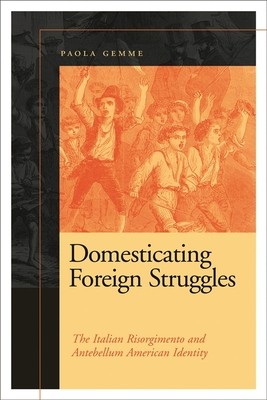
- We will send in 10–14 business days.
- Author: Paola Gemme
- Publisher: University of Georgia Press
- ISBN-10: 0820343412
- ISBN-13: 9780820343419
- Format: 14.7 x 21.6 x 1.5 cm, softcover
- Language: English
- SAVE -10% with code: EXTRA
Reviews
Description
When antebellum Americans talked about the contemporary struggle for Italian unification (the Risorgimento), they were often saying more about themselves than about Italy. In Domesticating Foreign Struggles Paola Gemme unpacks the American cultural record on the Risorgimento not only to make sense of the U.S. engagement with the broader world but also to understand the nation's domestic preoccupations.
Swayed by the myth of the United States as a catalyst of and model for global liberal movements, says Gemme, Americans saw parallels to their own history in the Risorgimento--and they said as much in newspapers, magazines, travel accounts, diplomatic dispatches, poems, maps, and paintings. And yet, in American eyes, Italians were too civically deficient to ever achieve republican goals. Such a view, says Gemme, reaffirmed cherished beliefs both in the United States as the center of world events and in the notion of American exceptionalism. Gemme argues that Americans also pondered the place of "subordinate" ethnic groups in domestic culture--especially Irish Catholic immigrants and enslaved African Americans--through the discourse on Risorgimento Italy. Thus, says Gemme, national identity rested not only on differentiation from outside groups but also on a desire for internal racial and cultural homogeneity. Writing in a tradition pioneered by Amy Kaplan, Richard Slotkin, and others, Gemme advances the movement to "internationalize" American studies by situating the United States in its global cultural context.EXTRA 10 % discount with code: EXTRA
The promotion ends in 14d.12:52:43
The discount code is valid when purchasing from 10 €. Discounts do not stack.
- Author: Paola Gemme
- Publisher: University of Georgia Press
- ISBN-10: 0820343412
- ISBN-13: 9780820343419
- Format: 14.7 x 21.6 x 1.5 cm, softcover
- Language: English English
When antebellum Americans talked about the contemporary struggle for Italian unification (the Risorgimento), they were often saying more about themselves than about Italy. In Domesticating Foreign Struggles Paola Gemme unpacks the American cultural record on the Risorgimento not only to make sense of the U.S. engagement with the broader world but also to understand the nation's domestic preoccupations.
Swayed by the myth of the United States as a catalyst of and model for global liberal movements, says Gemme, Americans saw parallels to their own history in the Risorgimento--and they said as much in newspapers, magazines, travel accounts, diplomatic dispatches, poems, maps, and paintings. And yet, in American eyes, Italians were too civically deficient to ever achieve republican goals. Such a view, says Gemme, reaffirmed cherished beliefs both in the United States as the center of world events and in the notion of American exceptionalism. Gemme argues that Americans also pondered the place of "subordinate" ethnic groups in domestic culture--especially Irish Catholic immigrants and enslaved African Americans--through the discourse on Risorgimento Italy. Thus, says Gemme, national identity rested not only on differentiation from outside groups but also on a desire for internal racial and cultural homogeneity. Writing in a tradition pioneered by Amy Kaplan, Richard Slotkin, and others, Gemme advances the movement to "internationalize" American studies by situating the United States in its global cultural context.

Reviews